Interview with John Gwynne
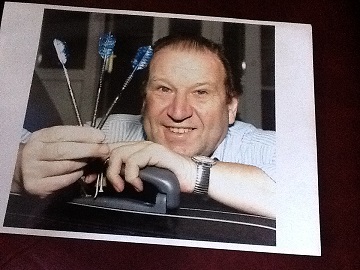
The darts with which Phil Taylor won his tenth world championship in 2002. He presented them on stage and live on TV, one-by-one, to Sid Waddell, Dave Lanning and John Gwynne after his defeat of Peter Manley. The commentators decided to keep them together and John has them in his charge.
John Gwynne, born in Shrewsbury in 1945, with Sid Waddell and Dave Lanning, formed the triumvirate of darts commentators which, crucially, helped shape the direction of the modern game.
Following Dave Lanning's retirement and Sid Waddell's death, John had hoped to take on the senior role within the commentary team. When this did not come about he decided, in 2013, after his 20th World Matchplay, to retire.
But darts is not the only sport in Gwynne's live - he's a cricket fan and - as most Englishman - a huge football fan. "His" team is Manchester City and his sporting hero the deceased former German goalkeeper of Manchester City - Bert Trautmann. To this day Gwynne still continues to commentate football on Sky Sports, works as an after-dinner speaker and host and travels around as MC on the darts exhibition circuit.
And so the pictures in the interview show Gwynne hosting a cricket dinner with Sir Garfield Sobers and Sir Richard Hadlee, together with the new memorial to Bert Trautmann in the entrance Hall of the Manchester City Stadium, during a football dinner talking to Bert Trautmann, talking to Sir Alex Ferguson and in the changing room of Manchester United together with Paddy Crerand, who once played für Manchester United and for Scotland.
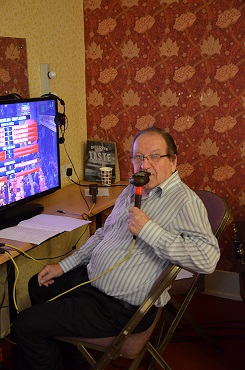
It is now two years you for the last time commentated for Sky Sports during a PDC tournament. Do you still follow darts on TV? Or even visit some tournaments?
I don't watch a lot of darts on TV but I keep in touch with what is happening. When one has commentated on it for many years, it is quite difficult to just sit and watch it. I have attended on two occasions since I left the Sky team in 2013. I had a half-day at the last world championships and another half-day at the recent World Matchplay when, in fact, I did guest commentary on an excellent first-round match between Ian White and Steve Bunting (see scoresheet!).
You chose the World Matchplay as your last tournament - was there a special reason for this?
My final decision to retire came when, for the second year running, I was left out of the commentary team for the World Cup of Darts in Germany. It had followed other disappointments at the World Grand Prix and World Championships. Following the retirement of Dave Lanning and the loss of Sid Waddell, I expected to be taking the lead role in the team. Instead, I was made to feel marginalised. The decision, in January 2013, to leave me out of the World Cup was the final straw.
I had done 20 World Championships with Sky Sports - all of them - and I thought it would be appropriate to go after my 20th World Matchplay, so I gave notice of my intention to finish at the end of the Blackpool extravaganza.
A few months later, I was inducted into the PDC Hall of Fame, something of which I am very proud. My son, Andrew Gwynne MP, came with me to the awards dinner at the Dorchester Hotel, London.
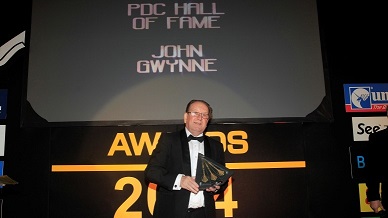
Are you now a pensioner or do you still work?
I was seventy on April 23rd, St. George's Day, so, yes, I am a pensioner. I still keep quite busy, however. I have done a few BDO/EDO events, commentating for Eurosport. I am quite active on the exhibition circuit and I am involved, as speaker or host, in sporting dinners and presentations. I retain my link with Sky Sports by covering football matches on their famous Soccer Saturday show and, in mid-week, too.
Do you miss commentating darts?
I would be fibbing if I said I don't miss commentating. It is a wonderful pursuit which I think I was pretty good at.
Do you enjoy just watching the darts or did you like it better to be really involved as a commentator?
Being involved as a commentator is much, much better than just watching!
What was the first tournament you commentated on TV?
My first tournament on TV was the Winners Matches UK Classic in Sheffield, in 1984. It was on an early satellite station called Screensport.
In essence, my proper TV debut was with Dave Lanning in September 1992, the first WDC tournament, recorded in the Talk of the East, Norwich, by Anglia Television, the UK Masters. The winner was Mike Gregory, who later returned to the BDO. He won a modest amount and a Lada car. In those early days of the WDC, I was the compere who announced the players on to the stage before rushing off to the commentary box. Because it wasn't a live broadcast, it all knitted together nicely!
You started commentating on the radio? Perhaps you could tell us a little bit about it.
I was the first broadcaster to cover darts on the radio. It was not commentary but intermittent reports into sports bulletins. It was for BBC Radio 2 Sport at the Embassy World Championships, the first being in 1990, the year unseeded Dane Jan Hoffmann beat number one seed Bob Anderson and Paul Lim achieved the nine-darter. I covered those championships for the BBC for a further nine years. In 1997, the BBC did a live 'test' commentary on the final with Roland Scholten and me. It was great fun but, sadly, it was never followed up.
Would you say it's more difficult to report on radio?
Reporting on the radio is no more or less difficult than commentating on TV. They are different disciplines.
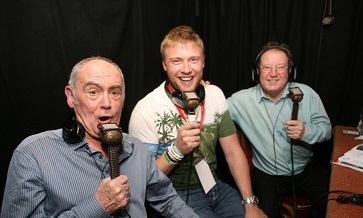
What for you makes a good commentator? And who are for you the good commentators after Dave Lanning, Sid Waddell and you?
For me, a good commentator is one who knows the game thoroughly, has an appreciation of its history and can impart those to the viewer. A sense of humour, allied to the ability to catch the right mood and tempo, is also helpful. One golden rule is to try to avoid stating the obvious, that which the viewer can see for him/herself and, whilst statistics are helpful, not to overload the commentary with them. My favourite current commentators are Rod Studd and Jim Proudfoot. Of former players who frequent the commentary box, I prefer John Part and Chris Mason. I love working with Wayne Mardle.
You first worked for the BDO and then switched to the PDC - had you decide as a commentator for one of the organisations?
Regarding my work as a darts commentator and reporter, I have never actually worked for either of the darts bodies. Whilst I have covered BDO and PDC events, I have been employed by either the BBC, ITV or SKY.
Do you have a favourite tournament?
My favourite tournament is the World Matchplay at Blackpool. The holiday atmosphere and being at the seaside in high summer make it a very special week. It was Sid Waddell's favourite event, too. He made his Sky debut at the very first Matchplay in 1994 while his last full tournament for Sky, prior to his illness, was at the Winter Gardens in 2011. For those reasons, I do believe the World Matchplay ought to have been the event for which the Sid Waddell Trophy is played.
Was there a special match you commentated you'll never forget? Or perhaps you can tell us which you think was the best match you ever commentated on?
I have had the pleasure of commentating on many great matches but I would have to choose the 2007 World Championship final between Phil Taylor and Raymond van Barneveld, the last at the Circus Tavern, as the best. I joined Sid in the box, replacing Dave Lanning, with Taylor leading 3-0. He had, thus far, demolished the Dutchman who, up to that point, had not hit a 180. More than two hours later and with 21 maximums under his belt, 'Barney' hit the winning double in a dramatic sudden-death single leg!
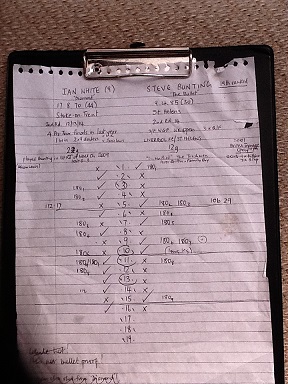
Is it necessary for a commentator to prepare for the matches or is it something you do impromptu? And how do you prepare?
I spend time before every match in preparation, noting each player's progress in the tournament, past performances, personal profile, family, home town, for example. I don't always use it but there are occasions when it is useful and, sometimes, pertinent. I log every leg, noting 180s, big checkouts and such like so that I can refer back to key moments, should I need to. Every match I have commentated on has been charted, leg by leg, as it has progressed. I still have the sheet on which I did my last match, Taylor v Lewis, at Blackpool.
Did you ever do the after match interviews as well?
I have rarely been asked to do post-match interviews. I don't know why. To be honest, it was, rightly or wrongly, one of the factors which gave me a sense of being marginalised.
You probably know most of the players - do you have some kind of all-time favourite?
Yes, I know most of the players pretty well. I get on with just about all of them. It is difficult to name a favourite one. Like many others, I always had a soft spot for Jocky Wilson, though, and Dennis Priestley and Eric Bristow are good pals.
From all your experience - would you say talent or hard work decides about the career of a darts player?
Hard work is an essential ingredient to success on the oche but the talent must be there in the first place! Talent alone does not win tournaments but, if you don't possess it, all the hard work in the world won't bring success.
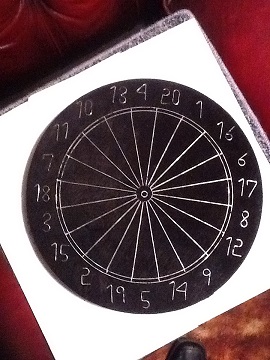
Do you play darts yourself and how good are you?
I don't play darts as much as I used to. I was a half decent Super League player who once picked up the 'most 180s' prize in a league in which Tony O'Shea and Darryl Fitton played!
I remember you are involved e Manchester log end darts - could you tell us about it?
I have played much of my darts on the Manchester board, very different to the traditional board. It is smaller. There are no trebles, the doubles are very narrow and the numbers are ordered differently. Only the '19' is in the same place. The thing I am most proud of in darts is that of saving the Manchester log-end board in 2003 when it was threatened with extinction.
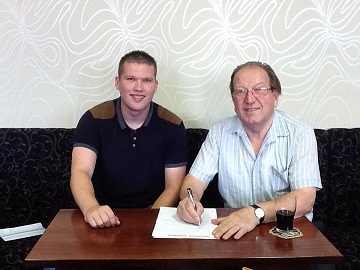
You even once sponsored a youth player - do you still sponsor Shaun Griffiths and how do you see his chances in the future?
Darts has been good to me. As a commentator, writer and mc/referee, I have earned a decent living from the sport. That is why I have enjoyed giving so much back. I started the Greater Manchester Super League in 1986 and, nearly 30 years later, I am still heavily involved. I set up the Manchester Log-End Federation of Leagues in 2004. Many hours are volunteered in seeing that these two projects are administered well.
In sponsoring a young Manchester player, Shaun Griffiths, in 2010, I felt I was helping him launch a successful career. Five years on, he still has not broken through big time but the signs are still there that he can. I remind him that Phil Taylor was 29 when he won his first world title, so, at 23, he still has time on his side!
Darts is not the only sport you are involved with - do you still work in football?
Yes, as I've mentioned earlier, I do a match from the lower divisions every Saturday for Sky Sports flagship programme, 'Soccer Saturday', and a fair number of mid-week matches. Many of the players and managers I have interviewed over the years have recognised me from the darts. They all seem to watch it! I covered rugby league and some rugby union for Sky Sports News for a number of years but football is the only sport I cover these days.
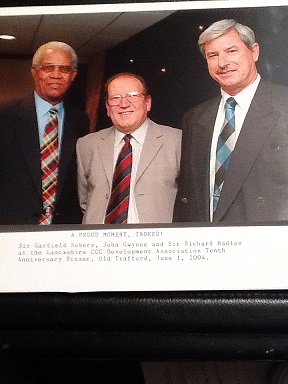
What is your favourite sport?
I grew up with two favourite sports, football and cricket. I played both at club level for many years, retiring from football when I was 34 and from cricket at 42.
Indeed, I gave up cricket soon after I gave up teaching in order to become a cricket commentator. I consider the best job I ever had was that of the BBC North West's cricket correspondent, following Lancashire's fortunes, home and away, for fourteen seasons. That's how I came to know Andrew 'Freddie' Flintoff so well.
Would you say darts is a real sport?
Darts is another sport I played, of course, starting in the South Manchester Log-End League at the age of eighteen.
I do regard it as a sport, although I acknowledge that athleticism is not a prime requisite!
Are there any similarities for you in all the different sports?
Competitiveness, concentration, self-control and an even temperament are qualities you need in darts, as in many other sports. The darts player is not unlike those who compete in other 'individual' sports like tennis, snooker and golf. Like a batsman out in the middle, maybe, because, in effect, he is on his own, too.
What were for you the real big changes in darts?
The biggest change in darts, evidently, has been the schism of the early '90s, the emergence of the WDC (PDC) and the involvement of Sky Sports in its coverage. I have clear recollections of the build-up to the 'split' and, of course, I have been very much involved in the TV coverage.
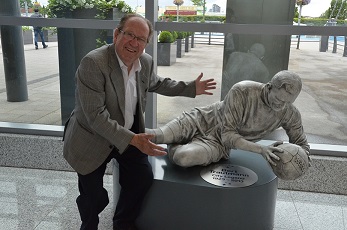
Would you say the darting legends like Jocky Wilson, Eric Bristow, Bob Anderson were as good as the players now-a-days and do you think they could keep up?
Regarding the great players of yesteryear, most of who are doing well on the 'legends' exhibition scene still, they would have to have raised their game quite a bit to live with today's top men. That's not to say they wouldn't, of course, but the standard is so much higher now. Three-figure averages and nine-darters were a rarity yesteryear: they are common-place today.
What are your ideas about women darts and did you ever comment on that as well? Do you think female darts would deserve more TV time (or stream time as now-a-days a lot of tournaments are streamed)?
I have commentated on women's darts. I remember witnessing Deta Hedman winning the Desert Classic in Las Vegas in 2006, I think, by beating American Caroline Mars. I was also on the microphone for Eurosport for a significant number of women's matches during 2014.
The top females provide great entertainment and deserve their 'hour upon the stage'.
Anyone who suggests they are as good as the men is living in cloud cuckoo land. The averages bear testament to that.
Nevertheless, the quality is good, the competition tight and, therefore, the matches enjoyable to watch and commentate on. This, surely, has to be considered by the PDC. Women's darts has to become part of its brief sooner rather than later!
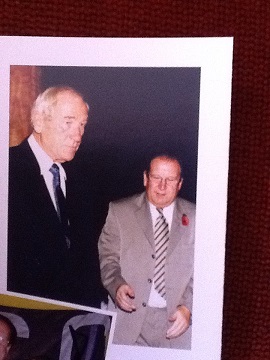
What do you think will be the future of the sport and the two organisations? Do you think the newest development - that there will be qualifiers for BDO players for the Grand Slam and that Martin Adams accepted the invitation for the tournament - show that there will be some kind of convergence between the two organizations?
I doubt whether there will be convergence between the two organisations for the foreseeable future. I think it would have been great for the sport had Barry Hearn's buy-out offer been accepted three or four years ago. I believe so much would have gone into grassroots darts and, in particular, County and Super League. Clearly, the BDO still struggle to get sponsorship and TV coverage. I use the word 'still' because, of course, they were the issues which led to the breakaway more than two decades ago.
You started your professional career as a teacher - how did it happen you ended as a sports commentator?
I spent 20 years in the classroom, four in a primary school, the rest in the secondary sector. I taught a number of subjects, English, Mathematics, History, Geography and R.E. in particular.
I used to help the PE department by taking a couple of games sessions each week. I suppose I was what is known as a Jack of all Trades, Master of None!
My most famous pupil was Michael Le Vell, better known as Kevin Webster in Coronation Street.
His first school play was 'Kes'. He played the part of pupil Billy Casper, the lead role, while I was his favourite teacher, Mr. Farthing. That was in 1978.
I loved the stage. Whilst at Moston Brook High School where I spent nine years, before my part in 'Kes', I played Fagin in Lionel Bart's 'Oliver' and Tevye the Milkman in 'Fiddler on the Roof'.
I studied drama at Edge Hill Teacher Training College and, in 1967, when I was 22 years of age, I was offered the chance to go to the Royal Academy for Dramatic Arts (RADA) in London but turned it down. I often wonder what might have been.....!
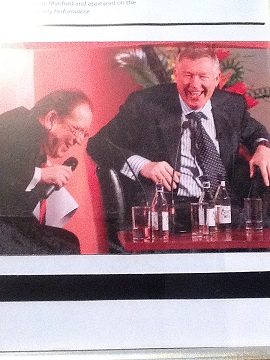
Was it not a risky undertaking to switch from a "secure" profession to the work of a freelance journalist? And would you do it again?
I gave up teaching in 1987 to take up a career in the media. I took a huge risk but I had great support from my late wife, Margaret, and, together, we made it work. I always knew that I could fall back on what is called 'Supply Teaching', filling in for teachers who are ill or have long-term absence for whatever reason. I never had to take it up, I'm glad to say. Margaret, to whom I was married for 20 years, died of cancer in 1994, a few weeks after my World Championship debut at the Circus Tavern.
Was darts more popular when you were young and were more young people playing darts?
Darts has always been popular but never before has it been as popular across the so-called class divide. People from all walks of life enjoy watching it nowadays whereas, back in the seventies and eighties, it was the preserve of, largely, the working class.
Do you think the UK players one day will lose their dominance and from which country you can imagine will come the most dangerous rivals?
Players from Britain, England in particular, will continue to be dominant for some time, I feel. The Dutch will continue to produce some top players, while Belgium and Germany look the most likely European nations to threaten.
It is important that, outside of Europe, a serious improvement is made in countries like Australia, South Africa and the USA. Perhaps darting development will be made in India, Japan and China, too. That would be good for the global game.
What are your thoughts about all those darts academies for young players? Will they help to an even higher standard in darts?
I have seen the darts academy at nearby Stockport College and the one at Andover in Hampshire, both at quite close quarters. I believe they do a terrific job, accommodating young players in an appropriate environment, monitoring their progress, offering advice and coaching and introducing them to competition. Only a relatively small percentage of the 'pupils' will make it to the very top but many more will go on to have a lifetime of fun playing the game at a variety of levels.
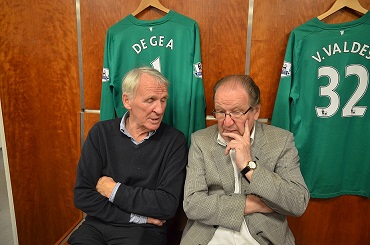
What are your ideas about soft-darts?
There was an effort by German company Lowen to introduce soft-tip darts machines into Britain in the late nineties but it didn't catch on.
Will it ever be successful in the UK?
People are so used to playing, free of charge, on an ordinary board hanging on the wall in the corner of a pub bar, they are never going to pay to throw the soft tip version. It might be that more 'Brits' are travelling to the continent to take part in soft-tip competitions.
When you look at Phil Taylor's career - would you say he's no longer so dominant because he's no longer as good or is it that there more players on his level now?
Phil Taylor's game has diminished over the past few years but, so far ahead of the rest was he that he can still win important events. He still has incredibly high moments - he recently hit the first Australian televised nine-darter - but the emergence of others who can match him has made it more difficult for him to dominate. He is, by far, the best there ever has been and nobody will ever match his amazing record.
Is it good or bad for a sport when it is dominated like this for a long time by one person?
It can be bad for a sport if one person becomes too dominant but such has been Phil Taylor's level of consistency that the public have nothing but admiration for him.
Who do you think will win the next PDC World Championship so it is still quite far away?
I believe Taylor will find it difficult to add a 17th world title to his tally but it is by no means impossible.
I do believe that Michael van Gerwen will be the next PDC world champion.
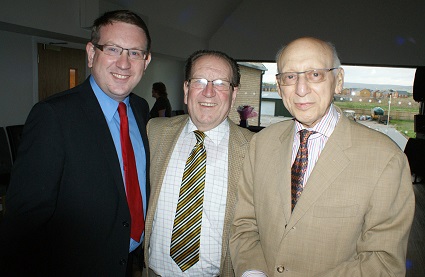
John's only son, Andrew, is the Member of Parliament for Denton and Raddish in Greater Manchester. The two Gwynnes are pictured here with Sir Gerald Kaufman MP, father of the House of Commons.